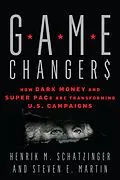The first book of its kind to provide an accessible overview of the changes Citizens United brought to political campaigns and political representation, it combines rigorous academic research with many examples of ongoing trends from the campaign trail. Even though campaign finance involves complex legal issues, the book is set up to be engaging for both students of political campaigns and American politics, as well as civically engaged citizens who want to learn more about outside groups and their impact on campaigns and public policy.
The book makes the case that Super PACs and dark money groups qualify as game changers of political campaigns not only because of what these groups can do independently from candidates and their increasing ability to match or even exceed candidates' financial resources, but because their actions influence the political incentives and strategies of candidates and political parties. We also point out evidence that those changes go beyond campaigns-they affect how legislators represent their constituents; how donors put pressure on lawmakers to adopt certain legislation after outside groups supported them; how the regulatory environment can benefit donors as a result of actions taken by federal agencies to repeal or dismantle existing laws; and how extreme positions by politicians can be incentivized and progress stalled when megadonors and outside groups reward political ideologues.
Our hope is that this text inspires readers to draw their own conclusions about the effects the U.S. Supreme Court's Citizens United decision has had and continues to have on the inner workings of American democracy. Some may even feel moved to take action that will empower ordinary citizens who want to have more of a voice in the democratic process. Given the high stakes associated with elections and the political changes they can bring due to the highly polarized political environment we live in, we believe that this book will add value to not only courses focusing on campaigns, elections, interest groups, and political communication, but also other courses such as introductory American Government courses.
Autorentext
Henrik M. Schatzinger is associate professor and chair of politics and government at Ripon College, where he teaches and conducts research on interest groups and money in politics. He is also codirector of the Center for Politics and the People at Ripon College, which organizes numerous events to promote constructive political debate. Schatzinger's research has examined the timing of campaign contributions and as a research analyst for the Campaign Finance Institute (20089), he has examined how democracy can be strengthened through small donors and volunteers. A new article coauthored by Schatzinger on lobbying for federal contracts is forthcoming in Social Science Quarterly . Schatzinger is teaching courses on campaigns and elections, interest groups, and money in politics.
Steven E. Martin is professor of communication and chair of the department at Ripon College, in Ripon, WI. He has published book chapters and articles about Wisconsin Governor Scott Walker's discourse about public unions, the labor movement's use of visual rhetoric as counter-propaganda, and the controversies surrounding NFL players' decisions to kneel during the national anthem. He teaches courses on the First Amendment, political campaign communication, American public address, environmental communication, media and society, and public speaking. He holds degrees from Colorado State University (M.A.) and The Pennsylvania State University (Ph.D.).
Inhalt
Preface
About the Authors
1. Super PACs and Dark Money as Game Changers
Understanding Differences Among Groups
Trump vs Pro-Trump Groups
How are Campaigns Changing?
Campaign Finance
Candidate-Group Signaling, Group-Group Coordination, and Candidate-Voter Communication
Effects on Political Parties
Dark Money Groups and Anonymity
Representation and Political Influence
Conclusion
Additional Reading
2. The First Amendment and Legal Issues
First Amendment Theory
The Marketplace of Ideas Model
The Self-Governance Model
The Liberty Model
Significant Legislation and Court Cases
The Federal Election Campaign Act
Buckley v. Valeo (1976)
Colorado Republican Federal Campaign Committee v. FEC
The Bipartisan Campaign Reform Act
FEC v. Wisconsin Right to Life Inc. (2007)
Citizens United v. FEC (2010)
SpeechNow v. FEC (2010)
McCutcheon v. FEC (2014)
Legal Issues Related to Political Campaigns: Four Tensions
To What Extent Should Corporations Have First Amendment Rights?
(When) Should Money be Protected as Speech?
Where Should We Draw the Lines of Responsiveness and Corruption?
Campaign Transparency: Do Voters Have a Right to Know Who Is Funding Campaign-Related Speech?
Conclusion
Additional Reading
3. Donors, Group Expenditures, and Representation
Donors
Super PAC Donors
Super PAC Recipients
Dark Money Donors
Dark Money Recipients
Group Expenditures
Purpose of Super PAC Expenditures
Ideological Breakdown of Dark Money Spending
Political Activity Versus Social Welfare
Nonprofits' Political Spending and Activities
Implications of Findings
So What? Effects on Candidates and Representation
Conclusion
Additional Reading
4. New Trends in Presidential Campaigns
Democratic Candidates, Trump, and Outside Groups in the 2020 Presidential Campaign
New Trends Since Citizens United
Playing the Delay Game
The Staff Shell Game
The New Money Primary
The Presidential Primary Vacuum
The Increasing Importance of Leadership PACs
Playing Pinball with Joint Fundraising Committees
Official Party Committees
Super PAC Activities Without Coordination
Super PACs Versus Incumbent Presidents During the Primaries
